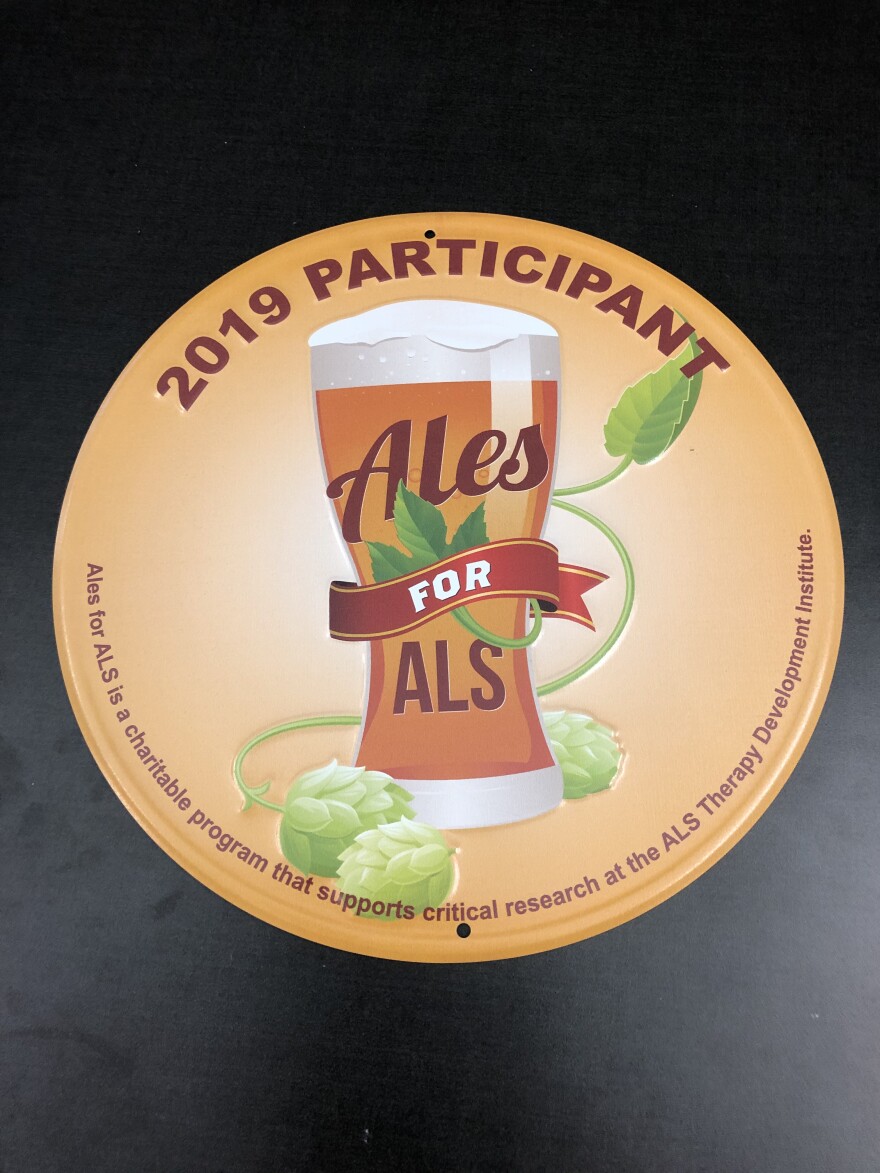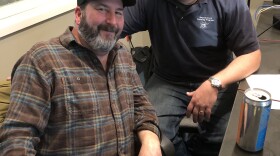Today on the Inland Journal podcast, the first in an occasional series we call “Suds and Spirits” or “Craft for a Cause.” We’ll tell stories about craft brewing and distilling in the Inland Northwest.
In this first program, we learn about how craft brewers around the country are donating to research to find a cure for Amyotrophic Lateral Sclerosis, ALS, Lou Gehrig’s Disease. The project is called Ales for ALS.
“Ales for ALS was put together about seven to eight years ago by Mike and Cheryl Smith of Loftus Ranches, hop growing company and family down in, been in the valley over 120 years, the Yakima Valley," said Mike Shannon, the program director for the ALS Therapy Development Institute. It’s based in Cambridge, Massachusetts. He lives in Washington. Mike and Cheryl Smith are the parents of the adult children who run the Bail Breaker Brewing Company in Yakima. It’s located in the family hop fields.
“Eight years ago, they wanted to find a way to support research at ALS Therapy Development Institute with a program that would provide hops to brewers in exchange for some percent of proceeds from the brewing of that beer going back to support the drug development research at the ALS Therapy Development Institute. Cheryl’s family was afflicted with Familial ALS, so they had generations of people that have the disease and by funding the lab, the hope was and still is to expedite treatments and therapies," Shannon said.
He says the Smiths are part of a hop growers cooperative, Hop Union, four or five families, in the Yakima Valley.
Mike Shannon: “And they then commit to each farm donating a percentage of the hops at Hop Union. This year it’s going to be 12,500 pounds of hops. I don’t know what the industry down there produces each year, but I know that they have over 1,500 acres of hops. I think combined they have 8,000-10,000 acres of hops, so 12,500 is a nice amount, but it’s a pittance compared to what they yield every year. Brewers commit to, and this is interesting because every state has different liquor laws, so you can’t, specifically in California, say, ‘We’re giving a dollar per pint back to the organization.’ You have to say it a different way. ‘We’re going to support the program and we’re going to make a donation.’ The equivalent is about a dollar per pint, brewed. We do have some situations where brewers are in distribution, so the margins are much tighter. Some cases it’s less than that, but that’s about the approximate. And then they donate back at the level they can and they feel comfortable at. Again, it ranges from people who are brewing a one-barrel batch, all the way up to a 40-barrel batch. So the donations are way different from one part of the country to the other, one size of brewery to the other.”
Shannon says Ales for ALS started with 60 brewers. This year, he says, there will be more than 300.
“It’s actually quite an easy sell," he said. "We rely heavily on our relationships with key anchor brewers in certain parts of the country that can help us. Where we don’t have a presence at all, we call upon, even Yakima Chief gave us a list of brewers that they would recommend that we contact. Three are in Mexico. We have, by the way, a Dutch, a German and a Japanese brewer in the program.
“We have 55 brewers in California. Part of the reason was, when I helped start the program with the Smiths, I lived in California, so I just called upon every California brewer that I know. Now that I’m in Washington, this year alone in Spokane, we recruited 10 brewers and then one in Coeur d’Alene, Daft Badger," Shannon said.
He says Ales for ALS has brewers in 37 states. Washington has 26 brewers in the program. One of the 10 in Spokane is the Golden Handle Project, a new company owned by Jason Gerstner and Tim Stoltz, which dedicated some of the proceeds from its very first beer to Ales for ALS.
“My day job is as a scientist and I study neurodegenerative diseases at WSU," said Jason Gerstner, an assistant research professor in the WSU College of Medicine and a fellow at the university’s Steve Gleason Institute for Neuroscience.
“ALS is actually something that isn’t just on my radar in the beer scene, but it’s something I’m actively participating in the real world, where we’re hoping to make some inroads as well. Part of that impetus was to reach out to Mike and say, ‘Hey, we’re the Golden Handle Project. Our mantra is ‘Craft for a Cause.’ We want to be able to promote this and this falls right in line with our mission," Gerstner said.
Tim Stoltz: “Mike and I met at a party, I guess. I was telling him about what we were doing with our brewery. It was right, literally, when we were getting started and Mike started calling, going, ‘Hey, we’re ready to kick out the hops. It all kind of laid out where it was our first beer and, with me, I come from a family where we like to give a lot. I had a grandfather that, it’s not ALS, but Alzheimer’s, so it’s like, anything that helps with that stuff, I’m really behind and that’s what Jason and I, our mantra was, so if we’re going to have a brewery, there’s a whole lot of breweries, but we wanted to have a brewery that actually makes a little bit of a difference in the world.”
“Mike, in turn, is also helping us," Gerstner said. "This kind of gets our mission and our cause on the map. It being our first beer seems quite apropos. Moving forward, Mike can list some of these events. We can join in some of these events and make active participation, to grow this idea, help out Ales for ALS and also get us interacting with other breweries and brewers.”
Mike Shannon: “To piggyback on what Jason was saying about the Steve Gleason Institute at WSU Spokane, I’ve been involved with his collaborator and co-hort, Marcos Frank, trying to help that get off the ground locally. The ALS community, as you may know, is a relatively small community, in terms of a disease state. If there are 35,000 people with the disease in the country, it doesn’t grow because 5,000 get the disease every year, 5,000 pass away. It stays relatively static. So, by working with other organizations, and the ALS Therapy Development works with Team Gleason in a number of ways, supporting patients in the community. But, in terms of the dollars that are raised via this program, it goes directly into our research program at ALSTDI and we try to be a very responsible non-profit in that, at least 80% of every dollar that we raise goes back into the actual function of trying to create treatments and therapies for ALS patients. We’ve even talked to Marcos and Jason about there might be collaboration efforts. There’s a researcher at WSU Spokane who actually has a therapy that he thinks can be used and go into a clinical trial for neurodegenerative disease. Those are the kinds of things that bridge all those gaps.”
Can you estimate how much you’ve raised for Ales for ALS?
Mike Shannon: “To date, through 2019, we’ve raised, starting in 2013, $2.6 million and, this year, we think we’ll raise between $800,000 and $900,000 more. Our lab is 35 scientists strong. It was created by the Haywood family back in 1997 because Jamie and Steven Haywood, who had the disease, found that when they would try to talk to drug companies about this disease, it was pretty much a closed door. They said, ‘Who’s doing the research?’ And they pointed a few directions. The majority of it, if not all of it, was academic research that was small scale. And so they said, ‘You know what? We’re going to start our own lab and they did. They modeled it after translational medicine labs that, the actions of creating such a concept have actually driven some of the other programs around the program that are at an academic level and created more innovative ideas and thoughts like WSU Spokane. So our researchers don’t have to make an application. The money we raise goes directly into our program. But we also do work with other organizations and academic institutions in helping to fund some of those collaborative efforts.”
Jason Gerstner: “One of the things that we like to help support in Spokane is to generate, not just an awareness for neurodegenerative diseases like ALS, but we also want to be a hub, eventually, where we can grow these programs and develop them, not just into research labs, but treatment facilities, care facilities, places where you can mesh and blend the needs, especially of ALS-type disease, where you have family members that need help, not just the patient. I can speak from the research side of things, but this is a goal of the Gleason Institute of Neuroscience, is to have each of these types of facilities available.”
So you’ve dedicated some of the proceeds from your first beer. Are you going to do it with future beers?
“Yeah, absolutely. That’s kind of our whole model," Tim Stoltz said. "We’re going to always be involved with Ales for ALS, but we also want to do it even more and reach out to other different diseases or causes and set up events where we can give back. Plus, on our website, we want to set up if somebody has a cause they want involved, we can actually have links to learn more about it because there are a lot of things out there that need attention.”
Mike Shannon: “Brewers are probably the most philanthropic people because, every brewer that I’ve been involved with, that runs an event or is part of the program, they are, throughout the year, probably contributing to three or four other causes. I think that kind of ability to be egalitarian about, it’s not just for this particular disease, it kind of enriches the idea of other brewers being involved. That’s a great example, too, of the idea of spreading the research out a little bit too, to piggyback again on Jason, just because we’re in Cambridge and just because all the big drug companies are in Cambridge and MIT, we’re not going to really solve this disease or create, ultimately, solutions that are widespread until we get hubs like this to be part of that whole process and have communities. Spokane is one of the largest deliverers of health care in the five or six states in the region.”
The ALS Therapy Development Institute will hold several events around the country later this year, in Tacoma, Alameda, California, Boston, Minneapolis and Raleigh, North Carolina. The Smith family will hold an event in July in Yakima.
“And locally, we want to host one next summer. Craig Dietz at Big Barn has agreed to provide the venue. If you’ve been up to Green Bluff and Craig’s place, it’s a beautiful place to go and drink beer and sit out there in the bucolic environment and lose yourself," Shannon said.
Mike Shannon is the program director for the ALS Therapy Development Institute, based in Cambridge, Massachusetts. Jason Gerstner and Tim Stoltz are co-owners and brewers of the Golden Handle Project in
Spokane.
Jason and Tim will join us for future installments of Suds and Spirits or Craft for a Cause, whichever we decide to call this podcast series. Today’s program is part of SPR’s Inland Journal podcast, which you can subscribe to at Apple Podcasts, NPR One or Google Play. The music in this program is by Baghdad Scuba Review.


